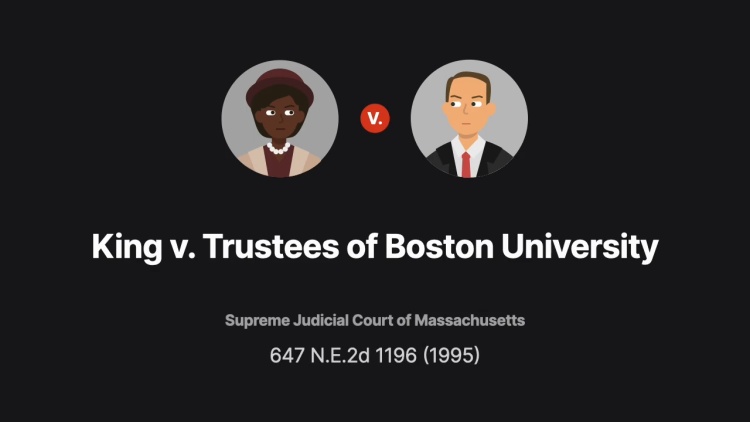King v. Trustees of Boston University
Supreme Judicial Court of Massachusetts
420 Mass. 52, 647 N.E.2d 1196 (1995)
- Written by Sarah Larkin, JD
Facts
Dr. Martin Luther King, Jr. made the decision to deposit correspondence, manuscripts, other papers, some of his awards, and other materials with the Trustees of Boston University (BU) (defendant). Accompanying the deposit was a letter. The letter stated: “I intend each year to indicate a portion of the materials deposited with [BU] to become the absolute property of [BU] as an outright gift from me, until all shall have been thus given to [BU]. In the event of my death, all such materials deposited with [BU] shall become from that date the absolute property of [BU].” When the materials were deposited, BU indexed the papers, made them available to researchers, and hired trained staff to take care of the papers and assist researchers. BU also held a ceremony for the receipt of the papers. Dr. King spoke at the ceremony about why he placed those papers in BU’s custody. Upon Dr. King’s death, his wife (Mrs. King) (plaintiff), as administratrix of his estate, sought the return of the materials from BU. Mrs. King filed suit. At trial, the jury determined that King made a charitable pledge to BU. Mrs. King filed a motion for judgment notwithstanding the verdict or for a new trial. The trial court denied the motion. Mrs. King appealed directly to the Supreme Judicial Court of Massachusetts.
Rule of Law
Issue
Holding and Reasoning (Abrams, J.)
What to do next…
Here's why 907,000 law students have relied on our case briefs:
- Written by law professors and practitioners, not other law students. 47,100 briefs, keyed to 996 casebooks. Top-notch customer support.
- The right amount of information, includes the facts, issues, rule of law, holding and reasoning, and any concurrences and dissents.
- Access in your classes, works on your mobile and tablet. Massive library of related video lessons and high quality multiple-choice questions.
- Easy to use, uniform format for every case brief. Written in plain English, not in legalese. Our briefs summarize and simplify; they don’t just repeat the court’s language.





